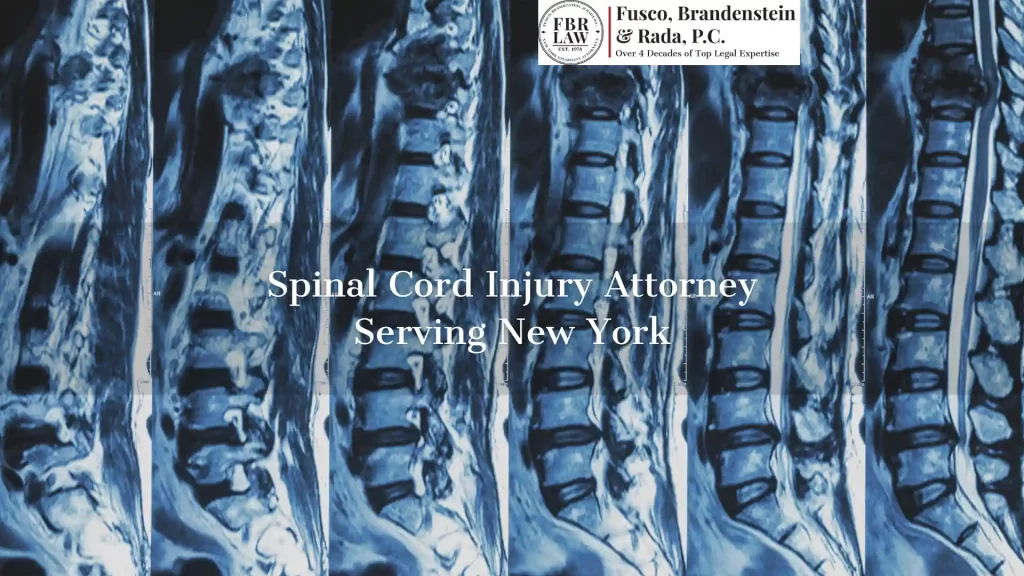
Did you suffer an injury to your spinal cord? Did it happen in a workplace accident? Are you unable to return to your job or earn your usual wages? If so, contact Fusco, Brandenstein & Rada, P.C. immediately. You might be entitled to benefits through workers’ compensation insurance.
Damage to the spinal cord can cause pain, reduced range of motion, and other debilitating symptoms. It can significantly affect the physical abilities you need to work. Many people need to take time off to recover or switch to a less demanding job. This can result in a loss of income while working fewer hours or taking a pay cut.
When you suffer an on-the-job injury, you can apply for workers’ compensation benefits. You shouldn’t suffer the financial strain of a workplace accident. Your employer’s insurer should provide the benefits you need to pay for your medical expenses and replace part of the wages you can’t earn while treating your spinal cord injury.
The New York workers’ compensation attorneys of Fusco, Brandenstein & Rada, P.C. are ready to fight for your rights as an injured worker. We will aggressively seek the maximum benefit payments you deserve. Call us today at 516-496-0400 to learn more about how we can help you after a job-related accident.
Common Spinal Cord Injuries in Occupational Accidents
The spinal cord is a long band of tissue between the base of the skull and lower back. It consists of nerve bundles and cells that transmit signals between the brain and the rest of the body. The nerve signals assist with movement and feeling sensations.
When the spinal cord becomes damaged somehow, a loss of sensation and mobility below the site of the injury can occur. It might be difficult to move the arms, walk, or pick things up with the hands. Some people experience a total loss of feeling in the limbs or extremities, indicating paralysis.
The severity of a spinal cord injury depends on its classification. The two main classifications of spinal cord injuries are:
- Incomplete – An incomplete injury means there’s still some sensory or motor function below the affected part of the spinal cord.
- Complete – A complete spinal cord injury results in a complete loss of feeling and motor function below the injury site.
Different types of spinal cord injuries indicate the areas of the body affected and the degree of damage. The most common types include:
- Tetraplegia
- Anterior cord syndrome
- Triplegia
- Brown-Sequard syndrome
- Central cord syndrome
- Paraplegia
Symptoms experienced with a spinal cord injury will depend on the type and affected body part but could include:
- Headache
- Trouble walking
- Inability to move the legs and arms
- Pressure, pain, and stiffness in the neck or back area
- Unconsciousness
- Loss of bowel or bladder control
- Unnatural positioning of the head
- A feeling of numbness or tingling spreading in the extremities
It’s vital to seek immediate medical attention if you suffer a spinal cord injury at work. An undiagnosed and untreated spinal cord injury could lead to permanent damage. It’s impossible to regain movement and mobility if you don’t follow the necessary treatment plan.
Workers’ Compensation Benefits for a Spinal Cord Injury
Workers’ compensation insurance provides two main types of benefits to covered employees injured on the job.
Health Care
Health care coverage is available if you treat your spinal cord injury with a doctor authorized by the Workers’ Compensation Board. Benefits include expenses for treatment, such as:
- Optometry
- Assistive devices
- Medically necessary drugs
- Surgical
- Medical
- Dental
If you choose to seek treatment with a doctor who isn’t an authorized healthcare provider, you will likely have to pay out of pocket. Workers’ compensation insurance won’t cover those costs.
Lost Wages
 Workers’ compensation also provides lost wage benefits to replace a portion of the income workers can’t earn due to an injury or illness. You could receive benefit payments if one or more of these factors apply to your spinal cord injury:
Workers’ compensation also provides lost wage benefits to replace a portion of the income workers can’t earn due to an injury or illness. You could receive benefit payments if one or more of these factors apply to your spinal cord injury:
- You work fewer hours or perform a different job, resulting in reduced pay
- You can’t work for more than seven days
You can’t collect lost wage benefits for the first seven days of a disabling condition unless the injury causes a reduction in income for longer than fourteen days. If your spinal cord injury affects your abilities beyond fourteen days, you might be able to receive benefits from the first day you couldn’t return to your job.
You should receive your first benefit payment within eighteen days after you suffered the injury or within ten days of the date, your employer learned of the injury, whichever comes later.
The amount of weekly payments depends on various factors, such as your degree of temporary disability and your average weekly wage for the year prior to the injury. The insurance company will use a formula to calculate your benefits. The formula takes the percentage of a worker’s disability and multiplies it by two-thirds of their average weekly wage.
For example, if your spinal cord injury causes a partial disability, your doctor might determine you have a disability rating of 50 percent. If you typically earn $400 a week at your job, two-thirds of that would be $266.67. This number would be multiplied by your 50 percent disability rating to reach a weekly benefit of $133.34.
How to Handle a Spinal Cord Injury at Work
There are multiple steps you should follow if you get hurt while performing your job-related duties:
- Report the accident – Inform your employer of what happened. You must notify your employer of your injury within 30 days if you want to pursue workers’ compensation benefits. Once 30 days pass, you could lose your right to benefits.
- File an Employee Claim form – Once you notify your employer of the workplace accident, they should give you a form to fill out for their workers’ compensation insurer. If you don’t receive the form you need to file a claim, you can print one from the Workers’ Compensation Board website.
- Seek medical treatment – It’s critical to begin treating your spinal cord injury immediately after the workplace accident. Only go to authorized doctors if you want to receive health care benefits.
- Maintain records – Keep a copy of every document related to your case, such as medical bills, prescriptions, and rehabilitation records. You need medical evidence to prove you sustained an injury at work and are entitled to workers’ compensation coverage.
- Hire a lawyer – Call Fusco, Brandenstein & Rada, P.C. for legal representation. We can file a claim on your behalf and seek the benefits you need during your recovery.
Contact Us
If you suffered a spinal cord injury in a work-related incident, do not hesitate to contact Fusco, Brandenstein & Rada, P.C.. With over 40 years of experience representing injured employees, we have the experience and knowledge to answer your questions and handle your case successfully.
Call us at 516-496-0400, or contact us online for your free consultation with one of our New York spinal cord injury attorneys. You can count on our legal team to fight by your side for the workers’ compensation benefits you deserve.
